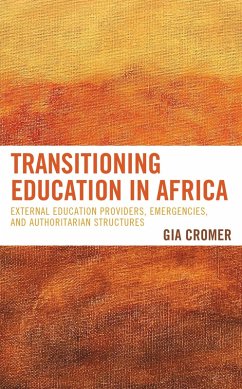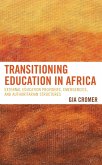Transitioning Education in Africa: External Education Providers, Emergencies, and Authoritarian Structures explores how transitions from education in emergency to post-conflict education systems are planned and managed at the national level. Currently, education for refugees is largely accomplished in emergency or crisis situations by external education providers (EEPs) in authoritarian contexts. Using historical analysis of education policies, appreciative inquiry surveys, and semi-structured interviews, Gia Cromer argues that despite historic and current international community stated goals of increasing government capability to provide education, neither EEPs nor refugee-hosting countries have made these changes, especially at the national level. This book provides insights on both historical norms toward Africa and authoritarian organizational philosophies and structures that could be contributing to this failure to successfully transition procedures to provide education. It also provides one of the few analyses of the problems in education provision for displaced people, asylees, and refugees specific to eleven countries in Africa. The analysis concludes with education policy recommendations for national-level education administrators to philosophically and practically decolonize education for the self-determination of future education structures in Africa.
Bitte wählen Sie Ihr Anliegen aus.
Rechnungen
Retourenschein anfordern
Bestellstatus
Storno









